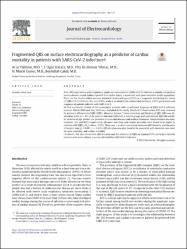| dc.contributor.author | Yıldırım, Arzu | |
| dc.contributor.author | Karaca, İbrahim Oǧuz | |
| dc.contributor.author | Kızılırmak Yılmaz, Filiz | |
| dc.contributor.author | Güneş, Hacı Murat | |
| dc.contributor.author | Çakal, Beytullah | |
| dc.date.accessioned | 2021-05-21T10:10:35Z | |
| dc.date.available | 2021-05-21T10:10:35Z | |
| dc.date.issued | 2021 | en_US |
| dc.identifier.citation | Yıldırım, A., Karaca, İ. O., Kızılırmak Yılmaz, F., Güneş, H. M. ve Çakal, B. (2021). Fragmented QRS on surface electrocardiography as a predictor of cardiac mortality in patients with SARS-CoV-2 infection. Journal of Electrocardiology, 66, 108-112. https://dx.doi.org/10.1016/j.jelectrocard.2021.03.001 | en_US |
| dc.identifier.issn | 0022-0736 | |
| dc.identifier.issn | 1532-8430 | |
| dc.identifier.uri | https://dx.doi.org/10.1016/j.jelectrocard.2021.03.001 | |
| dc.identifier.uri | https://hdl.handle.net/20.500.12511/6876 | |
| dc.description.abstract | Aims: Although severe acute respiratory syndrome coronavirus-2 (SARS-CoV-2) infection is mainly a respiratory system disease, recent studies reported that cardiac injury is associated with poor outcomes in this population. There are few studies which assessed standard electrocardiogram (ECG) as a prognostic tool during the course of SARS-CoV-2 infection. The aim of this study is to identify the relationship between of ECG parameters and prognosis of patients infected with SARS-CoV-2. Method and results: A total of 114 consecutive patients with a confirmed diagnosis of SARS-CoV-2 infection between March 2020 and May 2020 were included in the study. Standard 12‑lead surface ECG was reviewed for presence of fragmented QRS (fQRS), abnormal Q wave, T wave inversion, and duration of QRS. fQRS was observed in 36.8% (n = 42) of the patients who had SARS-CoV-2. Patient groups with and without fQRS did not differ in terms of age, gender, the presence of comorbid diseases and medical treatment. Hospitalization duration, intensive care unit(ICU) requirement, all-cause mortality, and cardiac mortality were found to be higher in patients with fQRS (all p values <0.05). There was a positive correlation between QRS duration and duration of hospital stay (p < 0.001, r = 0.421). QRS duration was also found to be associated with intensive care need, all-cause mortality, and cardiac mortality. Conclusion: Our data shows that QRS duration and the presence of fQRS on standard ECG can help to identify patients with worse clinical outcome admitted for SARS-CoV-2 infection. | en_US |
| dc.language.iso | eng | en_US |
| dc.publisher | Elsevier B.V. | en_US |
| dc.rights | info:eu-repo/semantics/openAccess | en_US |
| dc.subject | COVID-19 | en_US |
| dc.subject | SARS-CoV-2 Infection | en_US |
| dc.subject | Electrocardiography | en_US |
| dc.subject | Fragmented QRS | en_US |
| dc.subject | Cardiac Mortality | en_US |
| dc.title | Fragmented QRS on surface electrocardiography as a predictor of cardiac mortality in patients with SARS-CoV-2 infection | en_US |
| dc.type | article | en_US |
| dc.relation.ispartof | Journal of Electrocardiology | en_US |
| dc.department | İstanbul Medipol Üniversitesi, Tıp Fakültesi, Dahili Tıp Bilimleri Bölümü, Kardiyoloji Ana Bilim Dalı | en_US |
| dc.authorid | 0000-0002-4281-0867 | en_US |
| dc.authorid | 0000-0003-1919-3183 | en_US |
| dc.authorid | 0000-0001-5825-8627 | en_US |
| dc.authorid | 0000-0003-0230-6575 | en_US |
| dc.identifier.volume | 66 | en_US |
| dc.identifier.startpage | 108 | en_US |
| dc.identifier.endpage | 112 | en_US |
| dc.relation.publicationcategory | Makale - Uluslararası Hakemli Dergi - Kurum Öğretim Elemanı | en_US |
| dc.identifier.doi | 10.1016/j.jelectrocard.2021.03.001 | en_US |
| dc.identifier.wosquality | Q4 | en_US |
| dc.identifier.scopusquality | Q3 | en_US |


















